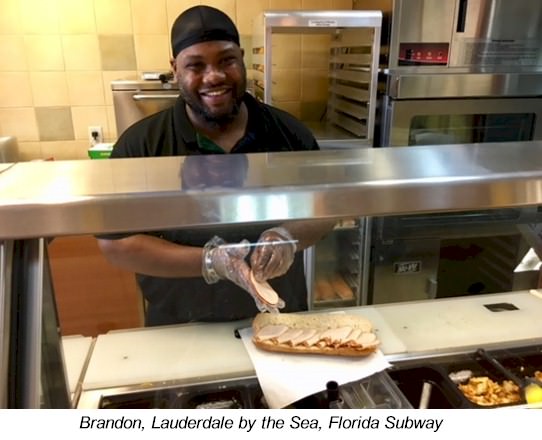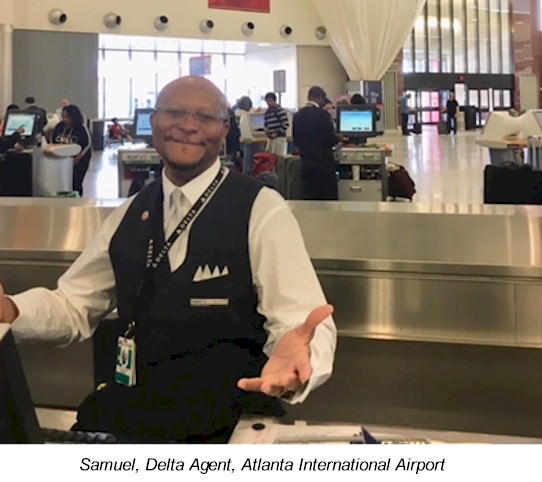By Roberta Nedry
Relax! Not that ‘F’ Word! This ‘F’ stands for Feelings, which are critical to any service interaction or guest experience and they must be front and center to make meaningful emotional connections. Whose feelings you might ask? Yours, theirs and ours!!!
How you perceive your guests are feeling as they arrive, experience and depart can make a powerful difference in the feelings they remember. Once that perception is made, the next step is how to respond and deliver behaviors that will make those feelings positive. How can hospitality leaders orient their teams to do this and deploy an “F” word strategy for each touchpoint in the flow of service delivery? How can this ‘F’ word lead to more repeat guests, referrals, increased loyalty and a better bottom line?
My son and I have sampled Subway restaurants all over the United States but have not typically been huge fans and go simply for convenience. Brandon is an employee at the Subway near our home and may have changed our minds based on the ‘F’ word. Each time we come in for my son’s pre-basketball workout special, He makes us feel remembered and special. He takes enough time to chat with us while also being efficient with the order and sensitive to other customers even though he is the only one working. He takes pride in the quality of the food and can describe menu items in detail. He is attentive to my 16-year-old son's specific tastes and spends time explaining the food quality to me. He makes the experience fun, efficient and engaging through his eye contact, his body language, his tone of voice by simply understanding our feelings and delivering what we need.
I will go out of my way to go to this Subway and probably only this Subway because of Brandon and how he makes us feel. I watched him with other customers and saw him adapt and adjust according to each customer’s feelings. He “gets” how to use the ‘F’ word in these brief sandwich-making moments and customers leave with positive vibes and perhaps a different perception of a fast food experience. We are proof of the ‘F’ word as a profitability/loyalty strategy as we repeatedly go back to be served by Brandon.
On the other hand, lack of feeling by an employee and misunderstanding how a guest is feeling can cause the opposite effect. While checking in for a Delta flight, the agent never looked up, did not make eye contact, performed her duties in a perfunctory and uninterested way and took much longer than normal to process our information. Our whole experience with her had NO ‘F” word, no concern for us getting to our flight on time, no desire to engage us or make us feel welcome or valued as regular Delta passengers and no feeling of concern that our documents were correct. There was no ‘F’ word in her greeting, her delivery or her farewell; basically, there was nothing and complete indifference.
As we went through security, the boarding passes she processed did not work and we had to rush back to another agent, causing us anxiety, delay and concern. That’s when we met agent Samuel, our new ‘F’ word king! He greeted us with a warm smile, even as we expressed our dismay. He took our concerns seriously, sensed our feelings of anxiety and immediately reassured us he would take care of things. He still needed to do his job and make sure all our information was correct, but he did so in a caring and efficient way. He knew the feelings he needed to address were our feelings of anxiety and frustration. He figured out how keep us calm and take care of what we needed while adhering to the airline’s rules, regulations and standards.
Samuel completely turned our very negative experience around by simply understanding our feelings. He could have just done his job and processed the new boarding passes, but he added the extra step of emotional engagement with how we were feeling and then made sure we left with positive feelings instead of the negative ones initiated by the first agent. His final smile and wish for a good trip was sincere, authentic and invigorating. We left as big Samuel fans and in turn, Delta Airlines with this revised “F” word experience. Connecting with how guests and customers are feeling as one delivers the tasks and actions needed is the service excellence bonus for any guest experience.
Look at Trip Advisor reviews and see how many times guests us the “F” word in their comments and why this should be a driving strategy.
Consider some positive reviews for a top Manhattan hotel:
“Good intimate feeling“, “they make you feel like they really want you there”, “I had a very good feeling when booking”, “all of us feel the same way-the staff are friendly, helpful and efficient, we shall return!”
Loyal guests, positive reviews and repeat business! The ‘F’ word does impact the bottom line!
On the other hand, poor use of the ‘F’ word can go the other way and undo so many other good parts by just one bad feeling or reaction:
“Great location but the front desk staff was not very friendly or focused on helping us understand what was available to us. The clerk ran through her list like the rapid-fire disclaimer talking at the end of a radio spot. It was disappointing because I wanted to love it, but she made me feel unwelcome.”
What a shame to create an exceptional property and ambiance, design fabulous guest experiences, establish standards for service excellence and then miss using the “F” word and mess up what everyone worked so hard on to create.
Feelings can go up or down and dramatically change the guest experience in an instant and influence other in their choices once shared. We all love to share stories about how we felt on a trip or what made an experience feel special. Unfortunately, we talk more about the bad stories than the good ones. Those hurt us most in the short term, especially with social media and in the long run as many guests today make decisions based on the feelings that are shared, reviewed, posted, repeated and referred.
Hospitality leaders and their teams should inspire their teams to etch the ‘F’ word front and center to their actions, reactions and behaviors to get more ups than downs, and more awareness of what causes positive or negative feelings.
And the “F” word must be integrated and inspired internally before it can be effectively used with guests and customers. What if employees come to work not feeling great or feeling sad, tired or frustrated about something? Can their co-workers or supervisors deploy the “F” word strategy to help them through their day? Our initial “unfeeling” Delta agent may have had a bad day-did her colleagues or supervisors notice? Did they help her to reboot? Service Excellence is a team sport.
What does it take to be aware and then proactive about turning feelings around? Employees who are not feeling well will not usually be able to convey good feelings to their guests. Someone MUST use the ‘F’ word to intervene before feelings domino down a negative trail. It may be as simple as a concerned question asking if the employee is okay when noticing a difference in disposition or attitude. It may require a brief conversation that shows someone cares about that employee’s feelings and then exploring if they can turn it around for that day of work and service delivery. Not addressing it allows negative or discouraging feelings to grow and possible tarnish other employees and guest experiences and results. Be aware of signs of the “F” word being misused meaning ‘feelings’ not addressed or acknowledged.
There are so many ways to integrate and inspire this “F” Word strategy.
- Introduce the “F” word concept at your next team and employee meetings and explain why it is important and significant to each role.
- Invite employees to identify the feelings they believe guests have at significant touchpoints, both positive and negative. Discuss how using the “F” word strategy could make a difference in each case and what behaviors or tools employees might need to do so.
- Explore how feelings are delivered or perceived through things like body language, eye contact, tone of voice, empathy. Inspire employees to identify specific ‘feelings’ instigators or detectors to help them deliver their roles more effectively.
- Spend time reading reviews and notice all the times guests or customers use the word “feel”. If it is good, figure out why and what in the “F” happened. If it is bad, figure out why and what in the “F” happened!
- Even in diverse society and cultures, there are universal feelings we all want and even crave. Things like feeling welcome, respected, safe and valued. Figure out what your teams can do with their own feelings to tap into guest emotions like above and empower them to play a more proactive role in the “F” word movement!
How people feel will be the lasting scorecard of guest and customer experiences. Yours, theirs and ours…Your feelings as you deliver your role. Their feelings of the guests reacting to the experience you provide. Our feelings as the hospitality and business organizations that will be impacted and the loyalty and dollars that will surely follow.
Editor Notes: By using the “F” word policy, you can avoid those awkward scenarios where your guests might resort to using the other ‘F’ word… such as in the case where only someone like Steve Martin can pull it off quite entertainingly. Let’s hope it never comes to this!
HotelExecutive.com retains the copyright to the articles published in the Hotel Business Review. Articles cannot be republished without prior written consent by HotelExecutive.com.



